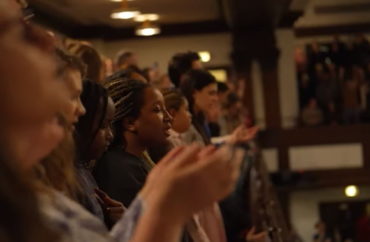
‘It’s okay if people don’t want to be my friend because I don’t try to please them. Instead I please the Lord.’
A majority of young women of faith say they don’t feel totally accepted in society, according to a new poll. But several Christians said the results are not necessarily bad — or unexpected.
“I don’t think you could call yourself a Christian and say you’re accepted by society,” Madison Campbell, a 19-year-old Christian who works as an assistant manager at a Starbucks in Indiana, told The College Fix when asked about the poll results.
The survey found 77 percent of women of faith ages 18 to 24 feel only a moderate or small amount of acceptance in society compared to 48 percent of people of faith in general.
The annual survey by the Becket Fund for Religious Liberty generates what’s called a “Religious Freedom Index,” which is “designed to give a broad overview of changes in American attitudes on religious freedom by surveying a nationally representative sample of 1,000 American adults each fall,” a news release from the group states.
The latest results, released in mid-January, found among other things that college-aged women of faith lag behind other demographic groups when it comes to feeling welcome in society.
Lori Windham, senior counsel for Becket, told The College Fix via email that “young women of faith feel less accepted than any other group of religious Americans because faith in our society is not always respected and protected like other aspects of our identity.”
Windham said she believes “we need to foster a more welcoming culture – especially for young women of faith who feel alienated from their peers.”
Nancy Pearcey, a professor at Houston Christian University and author of “The Toxic War on Masculinity,” told The College Fix that, in general, religious young women are conservative, marry young, possess better mental health than their liberal counterparts, and are more religious than young men.
All of these factors contribute to feelings of being less accepted by secular society, she said.
“Young women who are religious tend to be socially and politically conservative,
which means they are increasingly out of step with other young women in their age
bracket,” Pearcey said.
“Women who are religious conservatives tend to have better mental health, while secular liberal women have the highest rates of mental health problems,” Pearcey said, adding this “may also make for a larger perceived barrier between them and their secular peers.”
According to Pearcey, “young men are more secular than young women,” and therefore young women of faith feel “a disconnect” from young men or even “pressure to compromise their moral convictions.”
Corey Miller, president of Ratio Christi, a nationwide Christian campus ministry, told The College Fix the poll results do not necessarily reflect an alarming trend. Asked if it is important that a believer feel accepted in society, Miller answered “not necessarily.”
He said that “Jesus came to bring the sword,” referring to Matthew 10:34. He added that “being rejected by society could mean that believers are doing the right thing if what that society regards as acceptable is contrary to God’s regard.”
“This doesn’t mean we should seek rejection or that we should fail to be attentive to creative and loving ways of building bridges,” Miller said. “It simply means that the world of man has not always accepted the world of God.”
“I’d rather have my life be pleasing to God than pleasing to man,” he said.
Madison Campbell, a 19-year-old Christian, told The Fix that “right now, society is very opposing to…what most of our Christian beliefs are.”
Campbell said society today is focused on “people not getting married and not having kids, which is definitely the opposite of what Christians believe you should do.”
Campbell agreed with Miller that acceptance in society for a Christian is not necessarily to be welcomed or embraced.
“The Bible says specifically [to] be in the world and not of it,” Campbell said, citing John 17:14, which quotes Jesus as saying: “I have given them your word and the world has hated them, for they are not of the world any more than I am of the world.”
Iris Miller, a nursing student at Indiana University Bloomington, told The College Fix that as a young Christian in society, “in my experience, I think people are less likely to ask to do things with me or hang out with me over someone else who is less outspoken about their faith because of the assumptions they have.”
“I think some people assume I’m judgmental and look down upon others who don’t share my faith,” she said.
She added she does not think it is a bad thing to feel left out in today’s society, that the Christian faith is “living for Jesus,” not “living for ourselves and pleasing every human desire.”
“It’s okay if people don’t want to be my friend because I don’t try to please them,” she said via email. “Instead I please the Lord.”
The Becket Fund is a nonprofit, public-interest legal and educational institute that advances free expression for all faiths, according to its website.
MORE: Religious colleges beat back Calif. bill that would let transgender students sue them
IMAGE: Asbury Revival / YouTube screenshot





Please join the conversation about our stories on Facebook, Twitter, Instagram, Reddit, MeWe, Rumble, Gab, Minds and Gettr.